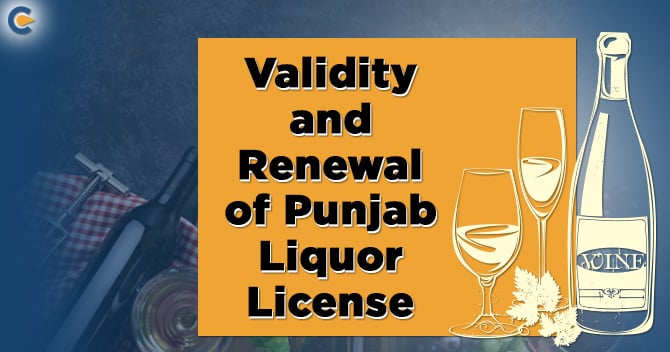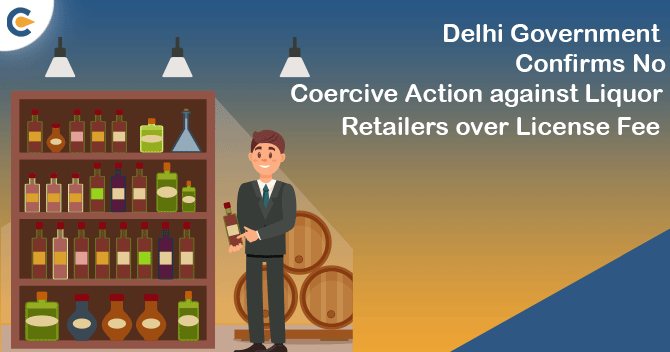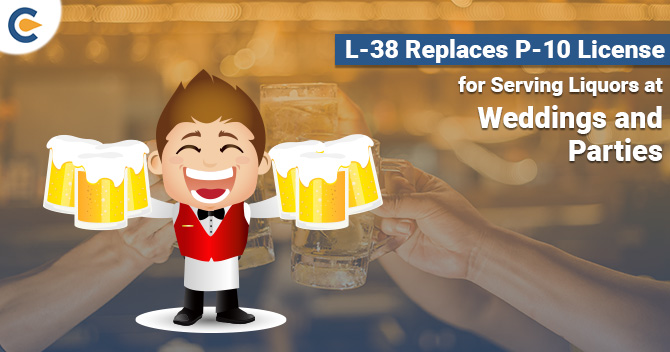The liquor license in India for selling liquor is mandatory and can be acquired from the Excise Department of the State Government. As a result, it can be renewed from time to time. A liquor license can be defined as the license granted and renewal of liquor license done by the state excise department to anyone who willing to indulge in the manufacturing, import, export, transport, possession, and purchase and selling of liquor and other alcoholic beverages.
Regulations governing the grant and renewal of Liquor licenses
- The authority, according to these rules, can grant and renewal of Liquor license in each case, but subject to restrictions contained in the Punjab Intoxicants License & Sale Orders. The localities in which permissions can be granted and the number of licenses that can be issued in any local area or other such reservations from the general superintendence of the Financial Commissioner as the State Government has to notify under section 8 of the Punjab Excise Act[1].
- Every license must be granted to an individual licensee in respect of certain premises.
- A license can only be granted for –


- When the license is granted to a Society or Company or Hindu undivided family or Government department as referred to in clause (b), (c), (e) and (f) of rule 4, it has to show the name of an individual as an agent acting on behalf of a licensee. On the application of the Company or Hindu undivided family or Society or the Government Department, the representative licensee can be changed by the authority competent to grant the license.
- When a license is granted to the partnership firm not incorporated under any Act, all the individuals comprising the partnership or firm must be specified on the license.
Renewal of Liquor license
- In the case of renewal of liquor license, the application is made in writing by all the original partners to the authority competent to renew the license, in case of licenses granted by auction, the proposed partner who is eligible under the Punjab Intoxicants Licenses and Sale Orders gets the license by the Collector. In each case, he shall be responsible for the obligations incurred for the license.
- The application made in writing of all the original partners, or by a partner, may at any time be removed, can also apply for renewable licenses, to the authority competent to renew the license, and in case of licenses is granted by auction, the Collector grants it.
- A license granted to partnership is determined by the dissolution of a partnership, subject to a liability of the partners severally and jointly for any losses caused to Government and for the performance of all obligations to the Government incurred by the partnership.
- A liquor license is to be renewed when it is continued after a period of its expiry to same licensees in respect of the same premises, and whenever a license has determined because of cancellation, surrender, or order of non-renewal or where it is proposed to issue a license in respect of the premises or persons not previously licensed, a new license is required; provided –
- The new license is not required on account of an addition of or removal of a partner on the application or in case the change of a representative of a company or society;
- A license continued to the legal representative of a deceased licensee for the remaining period must not be deemed a new license;
- If the premises of a licensee is changed during any period, the authority competent to grant the license may direct that the license may be continued for the remaining period of the term on the existing fee;
- A license can be transferred by the authority competent to grant it for the remainder of a new licensee.
Read our article:Procedure for Obtai ning Liquor License in India
Extension for Renewal of Liquor License
- All applications made for the grant, extension, or renewal of licenses require the Excise Commissioner’s orders under the Punjab Intoxicants License & Sale Orders. These rules should be received through proper channel in the Excise Commissioner’s office before the end of October, in each year:
- It is provided that the application for the grant of licenses in forms L-3, L-3A, L-4, L-4A, L-5, L-5A, L-5B, or L-12C may be submitted at any time in the financial year.
- However, an application for the renewal of the existing licenses shall be submitted by the 31st day of January of each financial year.
- Every application for the grant of license in form L-17, L-17A must be submitted through the Excise Officer-in-charge of the district with an advance copy to the Collector, on or before the 31st January preceding the financial year for which the license is applied for;
- Every application for the grant of a license in form L-10B must be submitted to the Collector through the Excise Officer Incharge of the district at any time of the financial year for which the license is to be granted. Every application for renewal of such a license shall, however, be submitted to the Collector on or before the 31st of January every year preceding that for which application for renewal of the license is made.
- No person to whom the license has been granted must be entitled to claim as of right renewal thereof. No claim will lie for damages or otherwise in consequence of any refusal to renew the license on the expiry of a period for which it was granted.
- Every application for renewal of a license, other than a license governed by rule 11, must be submitted to the Excise Officer in charge of the district by the 31st day of January, each year. The Excise Officer in charge of the district shall lay before the Collector by the 10th day of February each year a list of all licenses requiring renewal.
- The list must be accompanied in the case of licenses on the assessed fee, by a certificate of sales required by rule 30; in the case of bottling license by a similar certificate showing proof liters bottled up to 31st day of December. Except with a special sanction of the Excise Commissioner, no order for renewal or non-renewal must be made after [30th day of March] in respect of licenses for the following financial year.
- No license granted under these rules except a license for the vend of medicated wines, denatured, and rectified spirit in forms L-12, L-17, and L-19, respectively. It must be combined with any license for dealings with any dangerous drug, as defined in section 2(h) of the Dangerous Drugs Act, II of 1930, without the sanction of the Collector.
Liquor License for Distillery or Wine
- No person holding a license for a distillery or wine must hold any license under these rules, except –
- A license in Form L-1 for wholesale and retail vend of foreign liquor to the trade only;
- A license in form L-2 for wholesale and retail vend of foreign liquor to the public only.
- Provided that the holders of license in form B-1 under the Punjab Breweries Rules, 1956 may also hold a license Form L-10B of the retail sale of beer for consumption off the premises.
- A list of all licenses in Forms L-1, L-1B, L-2, L-2A, L-3, L-3A, L-4, L-5B, [L-5C, L5- D] and L-4A must be drawn up in each district in April each year and supplied to the managers of the distilleries and breweries in Punjab.
- A License in form L-9 may be granted with the permission of the competent military authority or Border Security Force authority for the sale of foreign liquor only in military or Border Security Force Units. All canteens, including unit military canteens or those, run regimentally on club lines, shall be required to take out this license.
- Special licenses in form L-12A may be granted for the retail vends of foreign liquor are required.
- The maximum period of such licenses will not, except with the special permission of the Excise Commissioner which exceed one month, i.e., from the first day of the validity of a license to the date immediately preceding that date in the succeeding month. If the license is granted for two or more days, it excludes an intervening day or days (e.g., a Sunday); no fee must be charged for the intervening day or days.
- A license in form L-12D shall be granted to Church Authorities only.
Liquor License for Country Spirit
- The maximum number of licenses for the wholesale vend of country spirit in form L-13 fixed for each district must not be exceeded without the Financial Commissioner’s sanction.
- A license in Form 20-A to sell may be issued by the Collector if, in any locality, there is a demand for such license.
- A license in Form 14-B may be granted for the vend of country spirit on special occasions, subject to the following conditions:-
- No special liquor license must be granted for any fair where such a license has there to not been given, or where having in the past been granted; it has now been discontinued. If a new fair is inaugurated, the Collector must not issue an exclusive liquor license without the consent of the Excise Commissioner.
- In the case of fairs for which the special liquor licenses have hitherto been granted, the Collector may continue to grant such licenses. He should, however, take cognizance of any bonafide movement favoring prohibition. He can, without any further sanction, decline to grant the special liquor license as provided in the Punjab Intoxicants License & Sale Order. He must be thoroughly satisfied that the discontinuance of such a license would be a measure approved by the unquestioned voice of the local opinion, and that such local opinion is free from any suspicion or connivance at illicit distillation.
- License for recurring fairs of importance at which it is permissible under these rules to provide for a sale of country liquor must be included in the list of shops to be auctioned.
Penalty
In case a licensee is found guilty of selling the liquor in contravention of the prices fixed as mentioned in sub-rules (2),(3),(4), he must be liable for the following action, namely:-
| For 1st offense | A penalty of Rs. Three Lakhs |
| For 2nd offense | A penalty of Rs. Ten Lakhs |
| For 3rd or subsequent offenses | Suspension of the license of a licensing unit or group or zone for one week |
Conclusion
To sell alcohol, one needs to procure a liquor license and renewal of liquor license. Usually, liquor stores, pubs, clubs, discos, bars, hotels, and restaurants own a license to sell alcohol. So, the sellers are required to hold a liquor license to sell alcohol. Otherwise, the selling of alcohol is illegal and prohibited until registration for a liquor license is done.
Read our article:How much does Liquor License cost in India?













